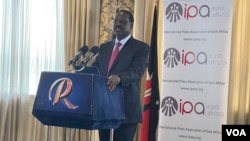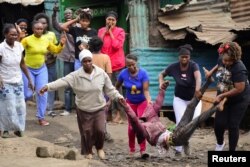Kenyan opposition leader Raila Odinga says a wave of protests against high taxes and the rising cost of living will continue, despite a cancellation of Wednesday's demonstrations. While he didn't say when the protests will resume, Odinga accused the government of using brutality against protesters and said officials are not willing to sit down and negotiate a way out of the crisis.
Addressing the international media on Tuesday in Nairobi, Odinga said the issue is no longer a party issue but a Kenyan issue.
"The most important discussion in our country today is the high taxes, rising cost of living and the ensuing protests," he said. "Although the tax protests have been initiated by Azimio, it has since gone beyond the party. After the passage of the finance act, Kenyans have defied party, political divides and united to resist punitive taxation and demand the lowering of the costs of basic commodities."
The Azimio la Umoja One Kenya Alliance leader said he didn't anticipate the treatment people received from the police, noting that violence should never be used to disperse protests.
"The unprecedented horrors of police brutality against the protesters. With constitutional guarantee for protests, we never imagine that police would outlaw protests, confront protesters, and kill so many as is the case now," Odinga said.
In a statement on Tuesday, the interior ministry said that 305 law enforcement officers have been injured and one has died while protecting lives and property. In addition, more than 850 businesses were broken into and looted.
Last week, Human Rights Watch accused Kenyan government officials of using hostile rhetoric against protesters and asked Kenyan officials to respect the demonstrators' rights to assembly and to peaceful protests. The organization said it has documented 16 people killed, either shot or beaten, by police between March and May.
Collins Orono, a child rights activist, said what's happening is unfortunate.
"This time around has actually [gone] too far because to an extent where tear gas can be lobbed into schools and in people's houses and people can be dragged from their houses and all that, that tells you that the cops and the government have been emboldened enough to continue doing this," Orono said.
But Orono also put blame on both sides, saying: "I think it all starts with our leaders recognizing that the nation is bigger than them; our politicians recognizing that we have over 50 million Kenyans and the politicians are very few — we've given a lot of power to the political class to the point that they can do whatever they want, at all costs; whether we are losing lives or not, whether children are being tear gassed or not, they don't care."
The Azimio political alliance said about 50 people have been killed since the protests started in March, but official numbers bring it down to about 20 people.
Police insist the protests are illegal and arrested 300 demonstrators last week.
Odinga said he doesn't want to be part of this government, but the government is not serious about negotiating a solution. He said there's even been outside intervention recently to mediate the crisis.
"The president from Tanzania came here two weeks ago at the invitation of President [William] Ruto to mediate and she was kept waiting not from our side, we were available, but the other side wasn't available. She spent two nights here, all in vain," Odinga said.
He also said other people have tried, and Ruto is the one who is resisting.
Odinga said he called off Wednesday's planned demonstrations to pray for those who have died and were injured during the protests. He didn't say when the protests will resume.





